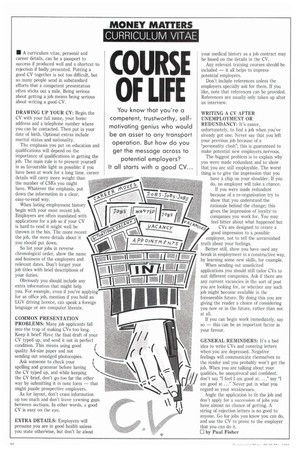COURSE OF LIFE
Page 34

If you've noticed an error in this article please click here to report it so we can fix it.
You know that you're a competent, trustworthy, selfmotivating genius who would be an asset to any transport operation. But how do you get the message across to potential employers? It all starts with a good CV... • A curriculum vitae, personal and career details, can be a passport to success if produced well and a shortcut to rejection if badly presented. Putting a good CV together is not too difficult, but so many people send in substandard efforts that a competent presentation often sticks out a mile. Being serious about getting a job means being serious about writing a good CV.
DRAWING UP YOUR CV: Begin the CV with your full name, your home address and a telephone number where you can be contacted. Then put in your date of birth. Optional extras include marital status and nationality.
The emphasis you put on education and qualifications will depend on the importance of qualifications in getting the job. The main rule is to present yourself in as favourable light as possible: if you have been at work for a long time, career details will carry more weight than the number of CSEs you might have. Whatever the emphasis, put down the information in a clear, easy-to-read way.
When listing employment history begin with your most recent job. Employers are often inundated with applications for a job so if your CV is hard to read it might well be thrown in the bin. The more recent the job, the more details about it you should put down.
So list your jobs in reverse chronological order, show the name and business of the employers and relevant dates. Don't forget your job titles with brief descriptions of your duties.
Obviously you should include any extra information that might help you. For example, even if you're applying for an office job, mention if you hold an LGV driving licence, can speak a foreign language or are computer literate.
COMMON PRESENTATION PROBLEMS: Many job applicants fall into the trap of making CVs too long. Keep it brief! Have the final draft of your CV typed up, and send it out in perfect condition. This means using good quality A4-size paper and not
sending out smudged photocopies. Ask someone to check your
spelling and grammar before having the CV typed up, and while keeping the CV brief, don't go too far the other way by submitting it in note form — that 'night puzzle prospective employers.
As for layout, don't cram information up too much and don't leave yawning gaps between sections. In other words, a good CV is easy on the eye.
EXTRA DETAILS: Employers will presume you are in good health unless you state otherwise, but don't lie about your medical history as a job contract may be based on the details in the CV.
Any relevant training courses should be included — it all helps to impress potential employers.
Don't include references unless the employers specially ask for them. If you like, note that references can be provided. References are usually only taken up after an interview.
WRITING A CV AFTER UNEMPLOYMENT OR REDUNDANCY: It's easier, unfortunately, to find a job when you've already got one. Never say that you left your previous job because of a "personality clash"; this is guaranteed to make potential new employers nervous.
The biggest problem is to explain why you were made redundant and to show that you are still employable. The worst thing is to give the impression that you have a chip on your shoulder. If you do, no employer will take a chance.
If you were made redundant because of a re-organisation try to show that you understand the rationale behind the change; this gives the impression of loyalty to companies you work for. You may feel bitter about what happened but CVs are designed to create a good impression to a possible employer, not to tell the unvarnished truth about your feelings.
Better still, show you have used any break in employment in a constructive way, by learning some new skills, for example.
When sending out unsolicited applications you should still tailor CVs to suit different companies. Ask if there are any current vacancies in the sort of post you are looking for, or whether any such job might become available in the foreseeable future. By doing this you are giving the reader a choice of considering you now or in the future, rather than not at all.
If you can begin work immediately, say so — this can be an important factor in your favour.
GENERAL REMINDERS: It's a bad idea to write CVs and covering letters when you are depressed. Negative feelings will communicate themselves to the reader and you probably won't get the job. When you are talking about your qualities, be unequivocal and confident. don't say "I feel I am good at. .. ," say '1 am good at ..." Never put in what you regard as your weaknesses.
Angle the application to fit the job and don't apply for a succession of jobs you have almost no chance of getting. A string of rejection letters is no good to anyone. Go for jobs you know you can do, and use the CV to prove to the employer that you can do it.
0 by Paul Fisher








































































































